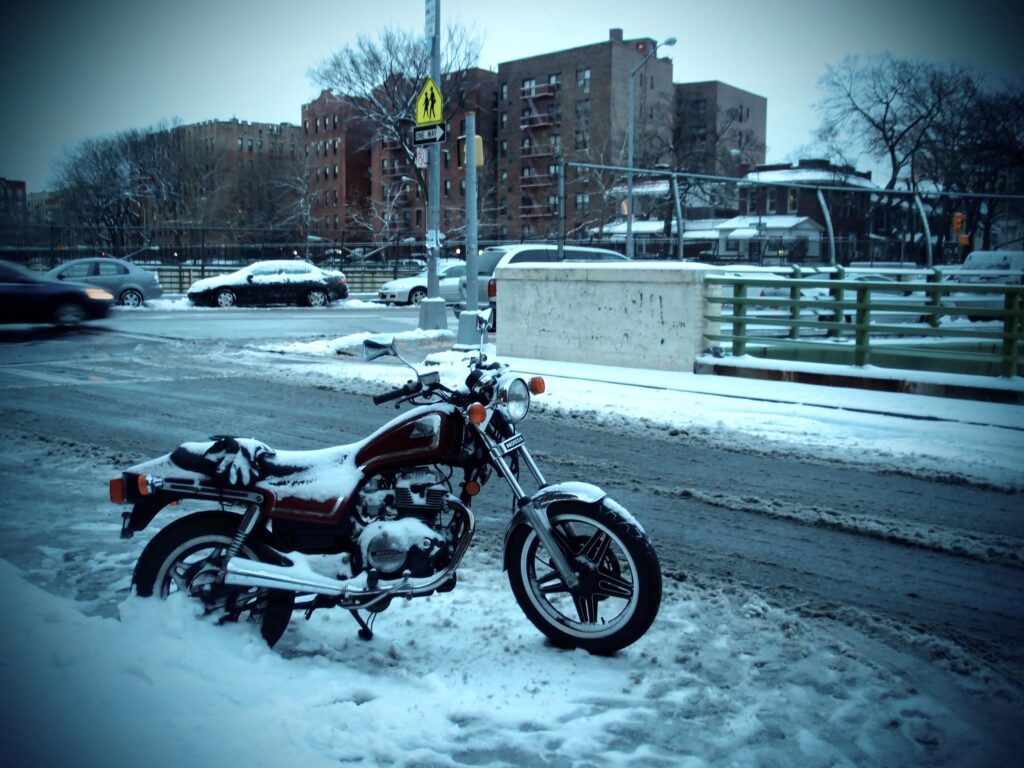
During the cold days of winter, many motorcycle riders put their bikes up until spring. With temperatures well below freezing in many parts of the country, it can be a dangerous time of year for anyone on the road. However, with specific safety precautions, you can ride your motorcycle all year with these winter motorcycle riding tips from the motorcycle accident lawyers at Lerner and Rowe.
Top Winter Motorcycle Riding Tips
Dress in Layers
In cold temperatures, it’s best to dress in layers. Start with a moisture-wicking base layer, followed by an insulating mid-layer, and top it off with a waterproof, breathable outer shell. This winter motorcycle riding tip will keep you warm and comfortable on your ride.
Upgrade Your Gear
If you’re going to be riding in the cold, you’ll need the right gear to stay warm. Invest in high-quality, insulated gloves, boots, and a balaclava. These will keep you warm and will help prevent cold weather injuries like frostbite. Consider heated gloves and socks for extra warmth. Invest in winter motorcycle boots with good traction and a windshield that deflects wind and snow.
Stay Visible
Choose a bright helmet with a Pinlock visor to prevent fogging. Reflective gear also increases your visibility in low-light conditions making it easier for others on the roads and pedestrians to see you. Make sure your headlights are working properly before riding in the dark.
Winterize Your Bike
Check your battery, antifreeze, and tire pressure regularly. Riding a motorcycle in snowy and icy conditions is not advised. If you live in an area with regular snowfall, consider winter tires with deeper treads for better traction on snow and ice.
Keep It Clean
Remove salt, brine, and build-up after rides. Both rock salt and brine used to treat roads lead to salt corrosion, which can significantly impact safety by damaging the parts of the motorcycle. Rust weakens metal, making it more susceptible to bending or breaking. Additionally, rusted brake calipers, rotors, or lines can hinder braking performance, increasing stopping distances and reducing your ability to react quickly to hazards. You can also keep your bike clean by investing in a good motorcycle cover to protect your bike from the elements. This will also help prevent corrosion.
Go Slow
Cold weather affects road conditions and your reflexes. Reduce your speed and increase following distances to prevent crashes. Don’t push yourself in challenging weather conditions. Along with not speeding and increasing following distance, avoid distractions.
Beware of Black Ice
Black ice is a thin, transparent layer of ice that forms on surfaces, most commonly on roads and sidewalks. It blends in with the dark pavement beneath it, making it difficult to see, especially at night or in low-light conditions. Shady areas, bridges, and overpasses are most prone to black ice. If you suspect black ice, be extra cautious, avoid sudden maneuvers on your bike, and try to stay in areas with adequate lighting.
Plan Your Route
If you’re planning a ride this winter, choose well-maintained roads and avoid unpaved areas. It’s best to avoid unfamiliar areas during winter weather. Check weather forecasts and road conditions before heading out.
Take Breaks
Cold weather drains your energy faster. Regularly pull over, move around, and warm up to avoid fatigue. It’s also important to stay hydrated as dehydration can sneak up on you in cold weather. Make sure to pack some water or sports drinks for your ride.
Tell Someone Your Plans for a Winter Motorcycle Ride
Before heading out, inform a friend or family member about your route and estimated return time. For additional security, share your location with them via your smartphone.
Practice in a Safe Environment
Before hitting the open road, practice slow-speed maneuvers and emergency braking on a controlled surface to get comfortable riding in winter conditions.
Don’t Ride in Snow
One of the most important winter motorcycle riding tips? Don’t ride in the snow. If possible, postpone your trip until the roads are clear and dry. Motorcycle tires are not designed for snow and have very little grip on slippery surfaces. This can lead to loss of control, skids, and crashes.
If you do get caught in the snow while on a winter motorcycle ride, the safest option is to get off the road and find shelter as soon as possible. Do not attempt to ride on if the snowfall is heavy or visibility is poor.
Injured in a Motorcycle Wreck?
By following the winter motorcycle riding tips mentioned above, you can enjoy riding your motorcycle all year while staying safe in the cold temperatures. Even when following these tips, collisions are always still possible. If you or a loved one are injured during a winter motorcycle ride due to the negligence or recklessness of another, our personal injury lawyers can help you win compensation for your injuries and more.
We have a proven track record of winning billion-dollar results for injury victims across the nation. Our team is committed to winning your case and handling your legal battle so you can focus on recovery.
To start your free case consultation, get in touch with us today. You can reach us at 844-977-1900. We are also available via LiveChat or by case review form.



